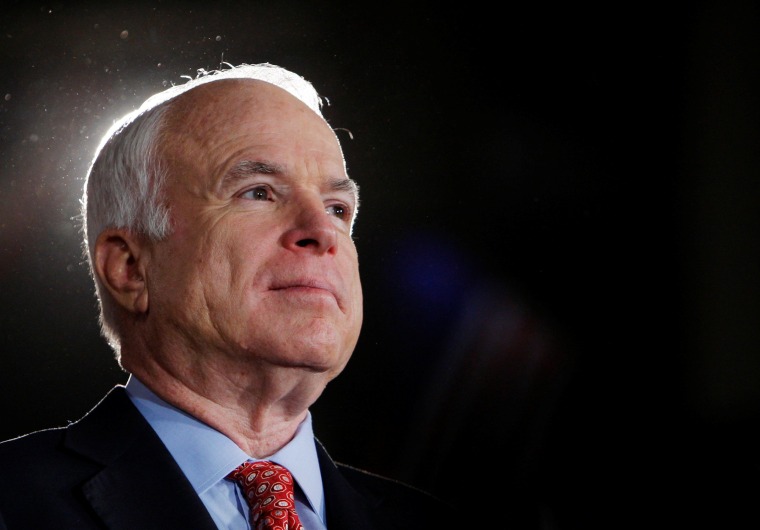I've lost count of how many times Donald Trump has gone after the late Sen. John McCain (R-Ariz.) this week, and though congressional Republicans have reportedly begged the president to back off, he clearly doesn't care.
In fact, in an interview with the Fox Business Network's Maria Bartiromo that aired this morning, Trump took yet another shot at the senator who's no longer able to defend himself. After a back and forth that lasted a while, the president eventually concluded:
"He was horrible, what he did with 'repeal and replace,' it was -- what he did to the Republican Party, and to the nation, and to sick people that could've had great health care, was not good. So I'm not a fan of John McCain, and that's fine."
There's no shortage of angles to Trump's preoccupation with McCain, some of which matter more than others, but what struck me as interesting about these latest comments is the fact that Trump doesn't seem to remember his own presidency especially well.
For a man who's boasted that he has "one of the great memories of all time," it's curious that he doesn't recall major events from a year and a half ago.
Let's take a brief stroll down memory lane.
In 2017, House Republicans, with no meaningful scrutiny or debate, passed a ridiculously regressive health care plan, intended to "repeal and replace" the Affordable Care Act. Trump, at least initially, threw his full support behind the GOP gambit, despite the fact that it contradicted most of the promises he made to the country during the campaign.
That plan died a swift death in the Senate, but Republicans in the upper chamber nevertheless hoped to advance the anti-Obamacare crusade with their own bill. That proved to be predictably challenging: GOP senators -- negotiating behind closed doors, without outside input, far from the committee process -- struggled to find a consensus.
Eventually, Republican leaders settled on a stripped down repeal bill, known as "skinny repeal," which no one liked, but which was intended to get the GOP-led House and the GOP-led Senate to a conference committee, where Republicans would try to work out some kind of intra-party compromise.
Members were told that the bill was simply a vehicle to keep the anti-health-care process alive a little longer. It didn't work: three Republicans, including McCain, balked.
In the interview that aired this morning, Trump said McCain's vote denied "great health care" to "sick people." There is no version of reality in which that makes sense. It was an awful bill that, if implemented, would've taken the system backwards.
In fact, as the Washington Post's Greg Sargent explained this morning, what the Arizona Republican actually did was reject his party's procedural abuses, while "blocking Trump's efforts to conspire with GOP elites to sell out on his promise to his voters."
If the president is desperate to convince the world that McCain was "horrible," he'll have to do better than this.
